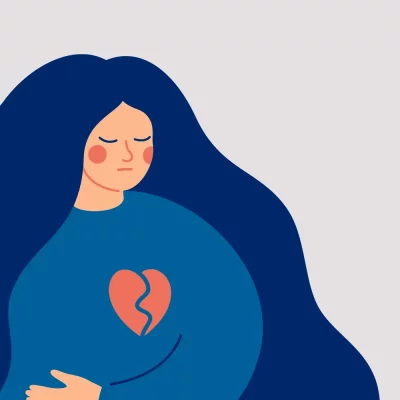Living with grief is difficult, but you don’t have to do it alone. Grief is an integral part of life because it helps us to process and come to terms with the loss.
The definition of grief is broad; it is the natural response to any kind of loss – not just when someone passes away. Grief can be caused due to death, a breakup, or even missing out on an opportunity. It’s important to recognize that everyone experiences grief differently, and there is no “right” way to grieve.
What Grief Looks Like
Often, when living with grief, we may feel various emotions. These can include shock, guilt, anger, and sadness. We might also experience physical symptoms such as fatigue and difficulty sleeping. Grief is unpredictable and overwhelming – it’s normal to have moments of feeling overwhelmed or even exhausted from the process.
Some other things that people can experience when grieving are:
- Loss of appetite or changes in eating habits: the body’s focus shifts from physical to emotional needs.
- Avoidance of reminders: this could mean avoiding places, people, and activities that bring up painful memories.
- Increased sensitivity: this could be to certain sounds, words, or smells.
- Feeling like it’s hard to concentrate: this is because the mind becomes preoccupied with thoughts of the loss.
- Being easily irritated or angry for no apparent reason: this is because of the emotional triggers associated with grief.
- Loss of joy and interest in activities that were once enjoyed: this is because your attention and focus are elsewhere.
Grief on a Neurological Level
Grief triggers the body’s fight or flight response, leading to physical symptoms like difficulty sleeping and a lack of appetite. Grief allows us to find closure and come to terms with the loss.
“Grief Brain” is a term used to describe how grief can make us feel disoriented, foggy, and disconnected from everyday life. Its symptoms include:
- Difficulty sleeping
- Appetite changes
- Loss of focus
- Lack of motivation or interest in activities.
Grief brain also creates a lot of cortisol, which can lead to feeling disconnected. It is important to remember that this reaction to grief cannot be controlled, but it will eventually subside.
According to Dr. Mary Frances-O’Connor, our brains make a bond or connection with the important people, things, and ideas around us, like a bridge. When that important person, thing, or idea isn’t there anymore, our brain functions as though the “bridge” is still connected. Dr. Mary Frances-O’Connor compared this to phantom limb syndrome; it expects that person, thing, or idea to still be there, even when it isn’t. O’Connor said that “the brain takes time to rewire the area where this connection has been made” because it’s a mechanical process that has to update and change how you relate to the world around you.
Coping and Living with Grief
There are many ways to cope with grief, and it’s different for everyone. For example, some people might find comfort in talking with friends and family, while others might find solace through hobbies or creative outlets. Talking to a professional therapist can also be helpful in understanding your feelings and emotions.
Some examples of ways that people cope with grief are:
- Exercise – Exercise can help reduce stress and cope with difficult emotions.
- Journaling – Writing down your thoughts and feelings can be a helpful way to process difficult emotions.
- Meditation or Mindfulness Practices – Meditation and mindfulness can help you reconnect with yourself and be in the present moment.
- Connecting with Nature – Spending time in nature can help to ground you and give you a sense of perspective.
The most important thing is to give yourself time and patience to process the grief. Grief takes time, so don’t try to rush it or ignore it. It is normal to feel overwhelmed, but taking small steps to find ways to cope will slowly help you to live with grief.
Living with grief can be difficult, but don’t forget that you are not alone, and resources are available to help you through it. Everyone grieves differently, so take the time and trust yourself to find the best way to cope.
Therapy for Living with Grief
Grief therapy can help a person confront the pain of loss, make sense of the situation, and accept what has happened. It can also help a person learn to live without that important person, thing or idea. Although the road is difficult, living with grief can be managed, and therapy can help you work through it.
Therapy is a helpful way to learn how to cope with loss and process through it. Cognitive Behavioral Therapy (CBT) is a type of therapy used to help individuals learn how to better cope with living with grief. This therapy focuses on finding healthy ways to manage your thoughts, feelings, and behaviors.
Cognitive Behavioral Therapy (CBT) is a type of talk therapy that focuses on examining the relationships between thoughts, feelings, and behaviors. CBT helps individuals learn how to better manage their thoughts, feelings, and behaviors in a way that helps them cope with living with grief.
During CBT, a therapist will will actively engage with you in conversations to help you learn how to identify and manage difficult emotions. They will also help you develop practical coping skills that can be used when emotions become overwhelming. CBT generally focuses on the present but can also involve exploring past experiences to better understand current thoughts and feelings.
This type of therapy aims to help you develop a better understanding of yourself, your emotions, and your behavior. The therapist will help you identify patterns of thoughts, feelings, and behaviors that may be contributing to grief. Then, you can work together to develop strategies that will help make living with grief more manageable.
Living with grief can be a difficult journey, but it is not an impossible one. With the help of friends and family, as well as professional therapy, living with grief can become more manageable. Take the time to explore the different ways of living with grief, and trust the process you are going through.
Remember, everyone grieves differently, and there is no “right” way to grieve. With patience, compassion, and resilience, you can find your own unique path for living with grief.
You are not alone in living with grief. Call Makin Wellness for more information on living with grief and how CBT therapy can help. Our team of mental health professionals is here to provide you with a safe space to explore, learn and grow. Visit our Grief Therapy page for more information on living with grief.








